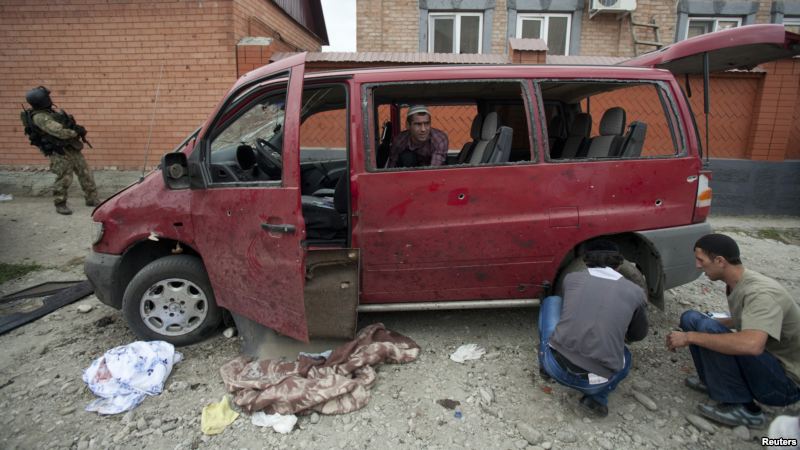
Security-Related Issues Continue to Plague the North Caucasus’ Smallest Republic
Publication: Eurasia Daily Monitor Volume: 9 Issue: 159
By:

On August 19, a suicide bomber attacked the funeral of a police officer in the village of Sagopshi in Ingushetia’s Malgobek district. Seven police officers were killed in the attack and at least 15 other people were wounded, nine of them seriously. Ilez Korigov, the police officer whose funeral was targeted by the suicide bomber, had been killed by gunfire the previous day. The power of the bomb detonated at his funeral was estimated to be ten kilograms of TNT. Although militant attacks of this kind are not new for this republic, special family events, such as funerals, were previously excluded by the insurgents from the list of legitimate targets. Following the attack, the head of Ingushetia, Yunus-Bek Yevkurov, announced three days of mourning, while Russian authorities provided hospitalization for those wounded in Moscow clinics (www.rian.ru, August 20). An Ingush police source was quoted as saying that the families of the slain police officers would receive record compensations—over $150,000 each (www.rian.ru, August 31).
Meanwhile, Yevkurov accused the leader of the Caucasus Emirate, Doku Umarov, and his lieutenant in Ingushetia, Artur Getagazhev, of staging the attack. The suicide bomber was provisionally identified as 34-year-old Khamzat Aldiev, but the details of the bomber’s identity were still under investigation as of September 2, and Yevkurov promised to apologize to Aldiev’s family if the investigation failed to establish his connection to the attack (www.rian.ru, August 27). Aldiev’s mother earlier stated that she did not recognize the dead suicide bomber as being her son (https://lifenews.ru/news/100271).
The security services quickly followed up with reprisals against those suspected of involvement in the attack. A massive police and military operation was launched in Malgobek district on August 28, and artillery was used to shell nearby forests. The shelling apparently achieved no tangible results, and was mainly designed to terrorize all locals indiscriminately. The security forces killed four suspects who were declared the perpetrators of the attack on the police officer’s funeral (Interfax, August 29). Ekho Kavkaza reported that the security service squads in fact executed each of the four suspects in a similar manner: government agents came to each of their houses, forcing the members of each family outside and then killing the suspects inside their houses (https://www.ekhokavkaza.com/content/article/24695558.html).
A police attack on an Ingush opposition figure further illuminated the nervous situation in the republic. On August 30, Berd Khazbiev, brother of the principal Ingush opposition activist, Magomed Khazbiev, was shot by the police in the city of Nazran. Berd Khazbiev was wounded but managed to drive home in his car. The police said he obstructed their actions, but it is unclear why they did not arrest him (https://kommersant.ru/doc/2013685). Three other Khazbiev brothers were beaten up and arrested when they visited Berd Khazbiev in the hospital. Fifteen other people were also arrested following the incident at the hospital, but 13 of them were subsequently released. The remaining five of those detained faced short-term, administrative arrests (https://www.kavkaz-uzel.ru/articles/212047/).
The territorial issue also unexpectedly hit Ingushetia, though from another side. The ruler of Chechnya, Ramzan Kadyrov, demanded that the administrative border between his republic and Ingushetia be properly defined. Since a row between Kadyrov and Yevkurov in early August 2012, when Kadyrov accused Yevkurov of sluggishness in fighting the insurgents, the Chechen government has stepped up efforts to define the administrative border with Ingushetia. “The boundary line, which we never had, and which has never been of interest to us, day by day, month by month, has been moving into Chechnya,” Kadyrov complained during a special meeting on August 26. According to Kadyrov, the Ingush leadership’s explanations, which referred to an agreement with the leader of independent Chechen republic of Ichkeria, Jokhar Dudayev, in the early 1990s, were not valid. “If Dudayev’s regime is recognized as illegal by Russian laws and by the Russian leadership, then all of the regime’s agreements, decrees and orders are also illegal,” Kadyrov said. “So we do not understand what kind of agreement with Dudayev they are talking about in Ingushetia. If, however, the border issues are decided according to what Dudayev signed, then we need to recognize the legitimacy of Dudayev, of his criminal regime and of all that he did. We need to recognize then that Ichkeria was a [legitimate] state.” Kadyrov promised to raise the border issue at the federal government level in order to resolve the uncertainty (Interfax, August 26). Yevkurov, in turn, warned that any attempt to review the existing borders between Ingushetia and Chechnya would destabilize the situation (https://evkurov.livejournal.com, August 28, 30).
Ingush and Chechens are closely related ethnically, speaking languages that are mutually intelligible. There is even a common name for both groups—Vainakh. Until the demise of the Soviet Union, Chechnya and Ingushetia were part of the same autonomous republic, Checheno-Ingushetia, with its capital in Grozny. After Dudayev came to power in Chechnya in 1991, the Russian government supported the division of Checheno-Ingushetia into Chechnya and Ingushetia. Chechnya under Dudayev chose to separate from the Russian Federation, while Ingushetia stayed within Russia. Ingushetia’s reluctance to secede from the federation was significantly influenced by the desire not to lose the opportunity of regaining the Ingush-populated areas of neighboring North Ossetia. However, the Ossetian-Ingush conflict of 1992 dashed the Ingush leaders’ hopes and did not change the existing administrative borders, while most of the Ingush population of North Ossetia was driven out of the republic and into Ingushetia. The administrative border between Ingushetia and Chechnya has been never properly defined, which has produced heated arguments between the two sides.
Moscow now will be in the difficult position of having to choose between Chechnya and Ingushetia. While Kadyrov certainly has serious lobbying opportunities, Ingushetia’s governor can argue that the situation in his republic will spiral out of control if any Ingush land is handed over to Chechnya. Since both peoples are close to each other and have mixed settlements, Moscow will find it difficult to divide the territory to both parties’ satisfaction. It is also unclear whether Moscow is genuinely interested in resolving the territorial dispute between Ingushetia and Chechnya or prefers to keep it up in the air for future use in manipulating both republics.




